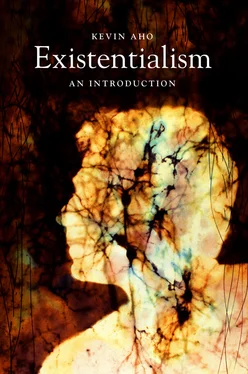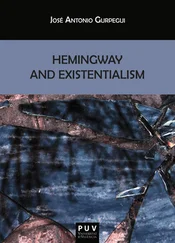Kevin Aho - Existentialism - An Introduction
Здесь есть возможность читать онлайн «Kevin Aho - Existentialism - An Introduction» весь текст электронной книги совершенно бесплатно (целиком полную версию без сокращений). В некоторых случаях можно слушать аудио, скачать через торрент в формате fb2 и присутствует краткое содержание. Год выпуска: 2013, ISBN: 2013, Издательство: Polity, Жанр: Философия, на английском языке. Описание произведения, (предисловие) а так же отзывы посетителей доступны на портале библиотеки ЛибКат.
- Название:Existentialism: An Introduction
- Автор:
- Издательство:Polity
- Жанр:
- Год:2013
- ISBN:978-0745651422
- Рейтинг книги:3 / 5. Голосов: 1
-
Избранное:Добавить в избранное
- Отзывы:
-
Ваша оценка:
- 60
- 1
- 2
- 3
- 4
- 5
Existentialism: An Introduction: краткое содержание, описание и аннотация
Предлагаем к чтению аннотацию, описание, краткое содержание или предисловие (зависит от того, что написал сам автор книги «Existentialism: An Introduction»). Если вы не нашли необходимую информацию о книге — напишите в комментариях, мы постараемся отыскать её.
Existentialism: An Introduction
Existentialism: An Introduction — читать онлайн бесплатно полную книгу (весь текст) целиком
Ниже представлен текст книги, разбитый по страницам. Система сохранения места последней прочитанной страницы, позволяет с удобством читать онлайн бесплатно книгу «Existentialism: An Introduction», без необходимости каждый раз заново искать на чём Вы остановились. Поставьте закладку, и сможете в любой момент перейти на страницу, на которой закончили чтение.
Интервал:
Закладка:
Perspectivism
Nietzsche, like Kierkegaard, was highly suspicious of systematic philosophy, largely because it was self-legitimating, that is, it uncritically assumes the truth of a set of principles and then uses these principles to construct the system. On Nietzsche's view, this kind of philosophy is ‘weak’ and ‘dishonest’ because it fails to rigorously question the principles that hold the system together. This is why he proclaims, “I mistrust all systematizers and avoid them. The will to a system is a lack of integrity” (1990, 35). For Nietzsche, metaphysical systems do not reveal the way the world really is because there is no ‘real’ world to begin with. “The ‘apparent’ world is the only one. The ‘real’ world has only been lyingly added …” (46). All systems, whether religious, philosophical, or scientific, are simply human constructions that express a psychological need for stability and control that protects us from the terrifying mutability and impermanence of existence. Indeed, to be human means to already inhabit and tacitly accept a socially constructed perspective that “we cannot see around” (Nietzsche 1995, 374).
Nietzsche's account of the interpretative or perspectival character of existence undermines the assumption that, through a method of rational detachment, the philosopher can attain ‘the perspective of eternity’ and gain knowledge of timeless truths or empirical ‘facts.’ From the point of view of perspectivism, “facts are precisely what there is not, only interpretations. We cannot establish any fact ‘in itself’. … [The world] has no meaning behind it, but countless meanings” (Nietzsche 1968, 481). The upshot of this account is that reality or truth is not discovered by means of reason; it is created. Throughout human history we invent different names for things and then call them true. Nietzsche calls this “the greatest difficulty … [that is] to recognize that unspeakably more depends on what things are called than on what they are” (1995, 58). Truths are viewed as “a mobile army of metaphors” that are invented and that continue to endure only insofar as they are “useful” (1954b, 46–47). They are passed down from generation to generation until they become “worn out” (47) and uncritically accepted as fact. Today, for instance, Euro-Americans generally accept the democratic ideals of equality, justice, and individual rights. But in Nietzsche's view, these are just calcified interpretations that have emerged historically from a contingent series of events that happened to take hold of the public imagination several centuries ago and over time came to be uncritically regarded as true. This is why Nietzsche says, “That you perceive something as [true] may be caused by the fact that you have never reflected on yourself, and are blindly accepting what has been designated as right to you since childhood” (1995, 335).
This means, of course, that consciousness itself is a social construction. All of our so-called inner beliefs, values, and thoughts are shaped by a particular sociohistorical perspective, and we can make sense of ourselves — and the social roles that we play — only in terms of this perspective. In this sense, our thoughts are not our own because consciousness does not belong to us. In order to have a thought, a need, or a desire we must have a word for it, because “all consciousness occurs in words” (354). Consciousness, therefore, is conditioned by a social world and the linguistic conventions that shape it. Nietzsche explains:
My thought is … that consciousness does not really belong to the individual existence of human beings, but rather to the social and herd nature in them; that, as a consequence, consciousness is subtly developed only in regard to social and herd usefulness, and consequently each of us, despite the best will to understand oneself as individually as possible, ‘to know oneself,’ will always just bring to one's consciousness precisely what is not individual in one. (354)
For Nietzsche, growing into social conventions in the way that we do has resulted in a standardized, leveled-down, and conformist consciousness, where “everything that becomes conscious becomes, by the same token, shallow, thin, relatively stupid, general … a signal of the herd” (354). With the conformity of herd consciousness, everything “strange, unusual, questionable, [and] disturbing” is explained and understood against the secure and stable backdrop of what is familiar and known. Nietzsche calls this the “ instinct of fear ” (355). It is flight from the horror that our perspectives are not secure and timeless but historically contingent and that there are innumerable ways of knowing the world, and this makes us afraid to question what we know, namely, the perspective that is most comforting and “familiar to us” (355).
To be sure, perspectivism serves important psychological and social functions because it allows us to arrange and make sense of an otherwise frightening and absurd existence. This is why Nietzsche says, “Truth is that sort of error without which a certain species of life could not live” (1968, 293). His critical aim, then, is not to deny the social utility of our belief in truth but to come to grips with the fact that the alleged stability and permanence of our truths is an “illusion” (1996, III, 24). Here, Nietzsche captures an important theme that will take center stage in twentieth-century incarnations of existential phenomenology: the idea that philosophy always begins from within the particular, embodied, sociohistorical context we grow into, a context that cannot be represented or explained by means of detachment and objectivity. This is because all rational explanations are parasitic on our own situated existence. As Heidegger will later write: “The existential nature of man is the reason why man can represent beings as such and why he can be conscious of them. All consciousness presupposes … existence as the essential of man” (1956, 205). And if an objective explanation of existence is impossible, then the best we can do is describe our experience as it ‘appears to us.’
Phenomenology
Inaugurated by Edmund Husserl (1859–1938) in 1900, the method of phenomenology was conceived as a return ‘to the things themselves.’ Rather than trying to systematically explain ‘ what things are ’ in terms of their material or psychic composition, phenomenology is a method that is concerned with describing ‘ how things are ,’ that is, how things reveal themselves or appear to us in ordinary experience. Phenomenology, then, is the science of phenomena , where ‘phenomena’ refers to that which appears, shows up, or is given to us in the immediacy of our everyday lives. This does not mean that appearances are somehow different from the way things really are . Phenomenology is not concerned with the traditional philosophical problem of discovering the enduring essence or reality that is hidden behind the flux of appearances. Indeed, the core epistemological distinction between ‘appearance’ and ‘reality’ is rejected altogether. Phenomenology is concerned simply with the phenomenon as it appears, as it “ shows itself in itself ” (Heidegger 1962, 51). The aim is to show that there is no reality or ‘thing-in-itself’ to be found behind the appearance. Indeed, the method of phenomenology demonstrates that appearances (or phenomena) are the things themselves. “This is why,” as Sartre explains, “we reject the dualism of appearance and essence. The appearance does not hide the essence, it reveals it; it is the essence” (1956, 4–5).
Phenomenology introduces two key points that reflect the existentialist project. First, phenomenologists contend that any theoretical demonstrations or proofs about the nature of reality are derived from and made possible by what is originally given in lived experience. Thus, in order to gain access to what is given, the phenomenologist can only describe what shows up and tries to suspend or ‘bracket out’ the theoretical frameworks of philosophy and the empirical sciences (e.g., psychology, biology, physics, etc.) in order to encounter what presents itself in experience as it presents itself . Second, phenomenologists agree that all experience has an intentional structure, that is, my experience is always about or of something; it is always directed toward an object. This is a rejection of the Cartesian view of the self as an encapsulated mental receptacle of ‘inner’ thoughts, desires, and beliefs that is somehow separate and distinct from ‘outer’ objects. In my everyday acts and practices, there is no ‘inner/outer’ distinction because I am already involved with and directed toward intra-worldly things. As Sartre says, when I am late for work and chasing the bus down the street I do not encounter myself as a bundle of desires and beliefs in a mental container; rather, I encounter my self as “running-toward-the-bus” (1957, 49). My being is found not in my head, but with the bus, and my experience is nothing apart from what it is directed toward. The self or ‘I,’ on this account, is not an object or thing but the ongoing activity of being directed toward things in the world.
Читать дальшеИнтервал:
Закладка:
Похожие книги на «Existentialism: An Introduction»
Представляем Вашему вниманию похожие книги на «Existentialism: An Introduction» списком для выбора. Мы отобрали схожую по названию и смыслу литературу в надежде предоставить читателям больше вариантов отыскать новые, интересные, ещё непрочитанные произведения.
Обсуждение, отзывы о книге «Existentialism: An Introduction» и просто собственные мнения читателей. Оставьте ваши комментарии, напишите, что Вы думаете о произведении, его смысле или главных героях. Укажите что конкретно понравилось, а что нет, и почему Вы так считаете.












